Food Business Registration
The food business is an evergreen venture in India. Its success stems from our cultural roots and love for different cuisines. The food sector tends to stay profitable if you know whom to target and what to offer. Not to a surprise, food businesses are compliance-intensive, attracting an array of operational norms. Depending on the business type, your business must abide by underlying norms to stay penalty-free and operational. When starting, getting a food license is mandatory.
Whether you run a lavish eating house, food packaging unit, or a milk processing plant, you will require permits like a food business registration. FSSAI i.e. Food Safety Standard Authority of India governs this license and grants it to eligible applicants. Knowing what’s required to get this approval is paramount to stay atop ambiguity.
Who Needs a Food Business Registration?
Food business registration serves as a fundamental legal permit for businesses belonging to the food sector, such as processing units, restaurants, eating houses, food storage facilities, packing units, raw material vendors, transportation facilities, etc. This license falls under the FSS Act 2006, legislation governing an entire supply chain of foods to safeguard public health and promote awareness against substandard products. Technically, as per the FSS Act 2006, the food business registration is classified under three major heads viz.
| License Type | Eligibility | Turnover Requirement | Scope |
| Basic Registration | Small food businesses, petty food manufacturers | Up to ₹12 lakh annually | Local, low-risk food operations |
| State License | Medium-scale food businesses | ₹12 lakh to ₹20 crore annually | State-wide operations for medium-sized units |
| Central License | Large-scale food businesses, importers, exporters, etc. | Above ₹20 crore annually | Nationwide and export/import-related |
Documents for Securing Food Business Registration
The table below reflects the documents required based on the type of license being chosen:
| License Type | Required Documents |
| Basic Registration | – Application form (Form A) – ID proof (Aadhaar, PAN, etc.) – Address proof (rent agreement, electricity bill, etc.) – Passport-sized photographs – Food Safety Management System (FSMS) plan (if applicable) |
| State License | – Application form (Form B) – ID proof (Aadhaar, PAN, etc.) – Address proof (rent agreement, electricity bill, etc.) – List of food products to be manufactured/sold – NOC from local municipality – FSMS plan – Declaration regarding food safety (if applicable) |
| Central License | – Application form (Form B) – ID proof (Aadhaar, PAN, etc.) – Address proof (rent agreement, electricity bill, etc.) – List of food products to be manufactured/sold – NOC from the local municipality – FSMS plan – Declaration regarding food safety – Import/export certificate (if applicable) – Complete list of machinery and equipment (for manufacturing units) |
Pointers worth Remembering
- Form A serves as an application for basic registration while Form B helps apply for state and central licenses.
- FSMS plan outlines the food safety management practices the business will implement.
- A No Objection Certificate from the local municipality may be required, ensuring adherence to local regulations.
- The list of products specifies the type of food items the business deals with.
Steps to Secure Food Business Registration
Depending on the type of license chosen, you must refer to the table below for securing the food business registration
| License Type | Process Steps |
| Basic Registration | 1. Prepare Documents: Gather all required documents (Form A, ID proof, address proof, etc.). 2. Submit Application: Apply online through the FSSAI website or in person at the local FSSAI office. 3. Application Review: FSSAI will review the application and documents submitted. 4. Inspection (if required): A local food safety officer may conduct an inspection of the premises. 5. License Issuance: If approved, you will receive your Basic Food Registration certificate. |
| State License | 1. Prepare Documents: Gather all required documents (Form B, ID proof, address proof, etc.). 2. Submit Application: Apply online through the FSSAI website or in person at the state FSSAI office. 3. Application Review: FSSAI will review the application and documents submitted. 4. Inspection: A state food safety officer will conduct an inspection of the business premises. 5. License Issuance: Upon successful review and inspection, the state FSSAI will issue the State License. |
| Central License | 1. Prepare Documents: Gather all required documents (Form B, ID proof, address proof, etc.). 2. Submit Application: Apply online through the FSSAI website. 3. Application Review: Central FSSAI will review the application and documents submitted. 4. Inspection: A central food safety officer may conduct an inspection. 5. License Issuance: If approved, you will receive your Central License certificate. |
Penalties for Non-Compliance Concerning Food Business Registration
Adhering to the norms of Food Business Registration is paramount as doing so will keep you isolated from the following penalties
| License Type | Non-Compliance Issues | Potential Consequences |
| Basic Registration | – Failure to maintain hygiene and safety standards – Not updating registration details – Selling unapproved food products | – Cancellation of registration – Fines and penalties – Legal action – Product recalls |
| State License | – Violating local food safety regulations – Non-compliance with labeling requirements – Lack of necessary inspections or audits | – Suspension or revocation of the license – Fines and penalties – Increased scrutiny from regulatory authorities – Criminal charges in severe cases |
| Central License | – Failure to comply with national regulations – Not following proper storage and transportation methods – Inaccurate reporting of production or sales | – Revocation of the license – Heavy fines and penalties – Legal action – Seizure of non-compliant products |
Conclusion
Businesses belonging to the food sector tend to experience stiff regulations to keep their operation up and running. Whether it is a matter of securing a food business registration or keeping up with event-based compliances, running a food business requires utmost supervision over prevailing legalities. If dealing with legalities is something you are not comfortable with, connect with an expert or professional firm like Adviso for professional assistance. That’s the smartest way to get started and have firm control over legal implications.
Read Our Article: How To Get an FSSAI License Number Easily?




